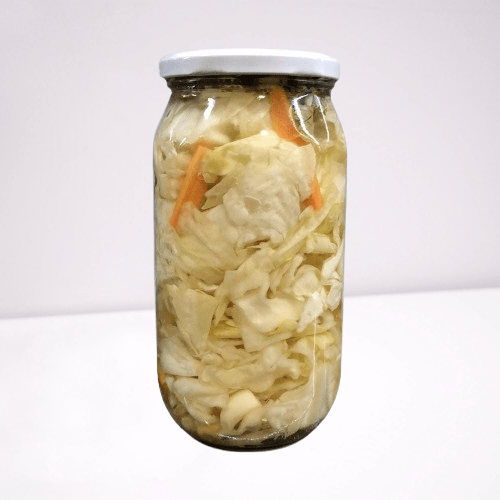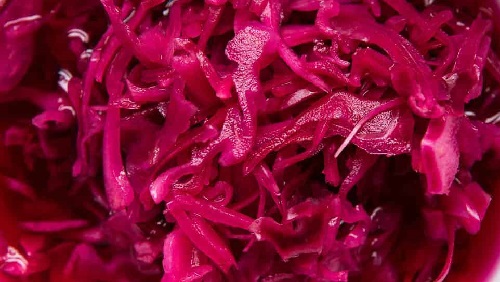Sauerkraut, a staple of German cuisine, is one of the most popular examples of fermented foods. It is rich in probiotics and an important source of calcium, phosphorus, potassium and vitamin K. In addition to boosting your immune system and improving digestive health, sauerkraut can also help you reduce allergies and inflammation by preventing autoimmune reactions.
HOMEMADE SAUERKRAUT RECIPE: Making sauerkraut is incredibly easy. All you need are a few jars and the following ingredients! Ingredients 2 cabbages, 3 tablespoons rock salt, 1 teaspoon caraway seeds, 1 teaspoon juniper seeds, bay leaf… Wash the cabbage well and cut into thin strips. Put in a bowl and add the salt. Mix well, squeeze with your hands, then add the remaining ingredients. Put the cabbage in sealable jars. Fill the jar with water, making sure the cabbage is completely submerged. Seal the jar and wait a day before adding water and an extra teaspoon of salt if necessary. Seal again and allow the cabbage to ferment for 2 weeks.

Cabbage pickle is a type of fermented food made by pickling shredded or chopped cabbage in a brine solution. The process of pickling involves preserving the cabbage in a mixture of salt, water, and sometimes spices. The natural fermentation that occurs during this process gives cabbage pickle its unique flavor and texture.
Here are some potential benefits of cabbage pickle:
- Probiotics: Fermented foods like cabbage pickle are rich in probiotics, which are beneficial bacteria that support a healthy digestive system. Probiotics contribute to the balance of the gut microbiota, promoting digestive health and potentially boosting the immune system.
- Nutrient Retention: Fermentation can enhance the bioavailability of certain nutrients in cabbage, making them easier for the body to absorb. This includes nutrients such as vitamins, minerals, and antioxidants present in cabbage.
- Vitamin K: Cabbage is a good source of vitamin K, which plays a crucial role in blood clotting and bone health. The fermentation process may enhance the availability of vitamin K in cabbage pickle.
- Antioxidants: Cabbage contains antioxidants, such as flavonoids and polyphenols, which can help combat oxidative stress in the body. Fermentation may potentially increase the levels of these antioxidants.
- Digestive Aid: The probiotics in cabbage pickle can contribute to a healthy gut environment, aiding in digestion and potentially alleviating digestive issues.
- Low in Calories: Cabbage is a low-calorie vegetable, making cabbage pickle a healthy option for those looking to manage their weight. It can add flavor and crunch to meals without contributing significant calories.
- Preservation of Cabbage: Pickling is a traditional method of preserving vegetables, allowing them to be stored for longer periods without spoiling. This can be particularly beneficial for using seasonal produce throughout the year.
While cabbage pickle can offer these potential benefits, it’s essential to consume it in moderation as part of a balanced diet. Additionally, the actual nutritional content can vary based on the specific ingredients and preparation methods used in making the pickle. Individuals with specific health concerns or dietary restrictions should consult with a healthcare professional or nutritionist before making significant changes to their diet.
What is the nutrition facts of cabbage pickle?
100 grams of cooked sauerkraut contains 19 calories. 100 grams of cooked sauerkraut contains 4.28 grams of carbohydrates, 0.91 grams of protein, 0.14 grams of fat, 2.5 grams of fiber.
The specific nutritional content of cabbage pickle can vary depending on the ingredients and the preparation method used. Below is a general overview of the nutritional components found in a typical cabbage pickle. Keep in mind that these values are approximate and may vary based on the recipe:

Cabbage Pickle (per 100 grams):
- Calories: 19 kcal
- Carbohydrates: 4.5 grams
- Dietary Fiber: 2.3 grams
- Sugars: 1.8 grams
- Protein: 1 gram
- Fat: 0 grams
- Vitamins and Minerals:
- Vitamin K: 48.2 mcg (60% of the Daily Value)
- Vitamin C: 19.0 mg (32% of the Daily Value)
- Folate: 16 mcg (4% of the Daily Value)
- Calcium: 40 mg (4% of the Daily Value)
- Iron: 0.5 mg (3% of the Daily Value)
- Potassium: 196 mg (6% of the Daily Value)
- Magnesium: 12 mg (3% of the Daily Value)
- Phosphorus: 26 mg (4% of the Daily Value)
These values are based on the nutritional content of raw cabbage and may change depending on additional ingredients, such as salt, spices, or other vegetables, used in the pickling process. Additionally, the fermentation process can influence the nutritional profile by increasing certain nutrients and promoting the growth of probiotics.
When consuming cabbage pickle, it’s important to be mindful of the salt content, as pickling often involves the use of salt for preservation. Individuals on low-sodium diets or with specific health conditions may need to limit their intake of pickled foods. As always, for the most accurate information, it’s advisable to check the nutrition label if available or consult the specific recipe used in preparing the cabbage pickle. is pickled cabbage good for weight loss, benefits of pickled red cabbage, how to pickle red cabbage, is pickled cabbage the same as sauerkraut, is pickled red cabbage good for your gut, is pickled red cabbage fermented, how to make sauerkraut… Is eating sauerkraut in winter good for health? >>
